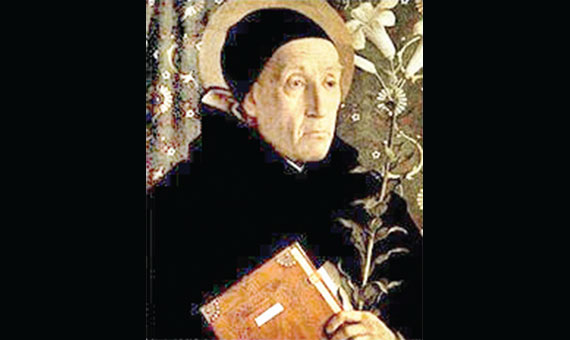Azadi ka Amrit Mahotsav Kolkata event honours four Clergymen
Pope Francis asks businesses to support working women: They’re ‘afraid to get pregnant’
Study: Christianity may lose majority, plurality status in U.S. by 2070
Indian politician declines Magsaysay Award under party pressure
Like John Paul II, Pope Francis heads to Kazakhstan during time of war

“The eye with which I see God is the same eye with which God sees me.”
German theologian, philosopher, preacher and mystic, Eckhart von Hochheim, commonly known as Meister Eckhart, was born at Hochheim in Thuringia, Germany. At the age of eighteen he entered the Dominican convent of Erfurt and was sent to study in Paris and Cologne where he studied under St Albert the Great. He taught at Paris and in between served as prior of the Dominican convent at Erfurt and later as provincial of the Dominican province of Saxony. He became famous as a preacher in German, and his brilliant and creative use of German makes him an author at once attractive and difficult. His readiness to exploit verbal ambiguities and dramatic paradoxes left him open to widely differing interpretations. When he was accused of heretical teachings in 1326 and was tried before the court of the archbishop of Cologne, he protested his innocence and appealed to the Pope but died during the proceedings. In 1329, Pope John XXII condemned 28 propositions of Meister Eckhart as heretical or misleading but stated that Eckhart recanted before his death everything which he had falsely taught, by subjecting himself and his writing to the decision of the Apostolic See. This censure, the nature of which is still unclear, has left the status of Eckhart in the Catholic Church uncertain. The Dominican Order pressed in the last decade of the 20th century for his full rehabilitation and confirmation of his theological orthodoxy. The response from the Vatican has been that there was no need for an official rehabilitation since he had never been condemned by name, but just some propositions of his which he was supposed to have held, and so we are perfectly free to say that he is a good and orthodox theologian.
Although he was an accomplished academic theologian, Eckhart is best remembered for his highly unusual sermons which he preached to guide his flock, as well as monks and nuns under his jurisdiction, with practical advice on how to attain spiritual and psychological transformation. The central theme of Eckhart’s sermons is the presence of God in the individual soul, and the dignity of the soul. His advice is that we should break through the complexity of all the particulars which confront us to reach the simple ground of all reality where God and the soul are inseparably one. This is achieved through a process of “letting go” and it produces the most intimate union with God from which the Christian life flows as spontaneously as God’s own life. The Word is thus born in the soul; indeed the soul gives birth to the Word. So he said: “When I preach, I usually speak of detachment and say that a man should be empty of self and all things; and secondly, that he should be reconstructed in the simple good that God is.”
In spite of the doubt about heresy, Eckhart was one of the most influential 13th century thinkers and remained widely read in the later Middle Ages. He influenced other famous mystics like, Henry Suso, John Tauler and Nicholas of Cusa. Several movements and ideologies have claimed Eckhart for themselves, including the Nazis, the Creation Spirituality of Matthew Fox, the Philosophy of Jacques Derrida, modern New Age spirituality which thrives on an all-inclusive syncretism, etc. Arthur Schopenhauer compared Eckhart’s views to the teachings of the Upanishads. The notable humanistic psychoanalyst and philosopher Erich Fromm was another scholar who brought renewed attention in the West to Eckhart’s writings, drawing upon many of his themes in his large corpus of work. Eckhart was a significant influence in developing Dag Hammarskjöld’s conception of spiritual growth through selfless service to humanity, as detailed in his book of contemplations called “Markings” Carl Jung summed up his view of Eckhart saying: “The world-embracing spirit of Meister Eckhart knew, without discursive knowledge, the primordial, mystical experience of India as well as of the Gnostics, and was itself the finest flower on the tree of the “Free Spirit” that flourished at the beginning of the eleventh century. Well might the writings of this Master be buried for six hundred years, for his time was not yet come.” Interest in the writings of Meister Eckhart remains undiminished even today.
Isaac Padinjarekuttu
(Professor of Church History
at Oriens Theological College, Shillong)
Leave a Comment